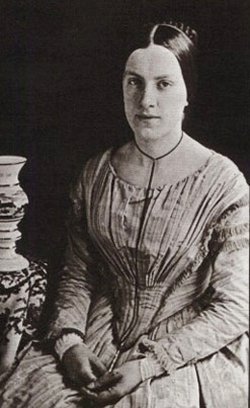
|
~Emily Dickinson~ |
|
Criticism |
|
As early as 1891, William Dean Howells wrote that "If nothing
else had come out of our life but this strange poetry we should feel that in the work of Emily Dickinson, America, or New
England rather, had made a distinctive addition to the literature of the world, and could not be left out of any record of
it." Dickinson
has been placed alongside Walt Whitman, Wallace Stevens, Robert Frost, T. S. Eliot and Hart Crane as a major American poet. Almost unknown as a poet in her lifetime, Emily Dickinson is now recognized as one
of the greatest poets of all time. Feminist critics
see her as a victim of patriarchy in general or her father in particular; gender critics find homosexuality in her life and
writings. Northrup Frye points
out, "It would be hard to name another poet in the history of the English language with so little interest in social or political
events." She lived through the Civil War, yet her poems contain no clear references to that national horror" (Sewall 10).
Mr. Conrad Aiken
said, “It is apparent that Miss Dickinson became a hermit by deliberate and conscious choice.” Allen Tate said, “All pity for Miss Dickinson’s
“starved life” is misdirected.” “Her life was one of
the richest and deepest ever lived on this continent” (Sewall 19-20). Marxist Theory Response
(pg. 102, poem 223) I
Came to buy a smile-today- But
just a single smile- The
smallest one upon your face Will
suit me just as well- The
one that no one else would miss It
shone so very small- I’m
pleading at the “counter”-sir- Could you afford to sell- I’ve
Diamonds-on my fingers- You
know what Diamonds are? I’ve
Rubies- like the Evening Blood- And
Topaz-like the star! ‘Twould be “a Bargain” for a Jew! Say-may I have it-Sir? Marxist theory consists of political, social, and economic views and concepts of Karl Marx
and Friedrich Engels. Marxist critics believe that class struggles and roles
play an important part in understanding oppression. Marxist critics focus on
the unequal rights or privileges between the rich and the poor.
This poem implies that no matter how rich or poor you are, you can not buy happiness or a smile. From a Marxist perspective I could argue money can buy you love, but it can buy you sex. Meaning that a wealthy woman could have afforded to visit a doctor as well as benefit from medication such
ad anti-depressants such as ecstasy or amphetamines, which were commonly prescribed for short term use in Feminist Theory Response
(pg. 29, poem 53) Taken
from men –this morning- Carried
by men today- Met
by the Gods with banners- Who
marshalled her away- One
little maid-from play mates One
little mind from school- There must be guests in All
the rooms are full- Far-at
the East from Even- Dim-as
the border star- Courtiers
quaint, in Kingdoms Our departed are. Feminist theory refers to the beliefs that women are treated unequally from men. Feminists believe that women should to receive equal treatment socially, politically, and economically. Feminists believe that women are still treated as subordinates to men.
Some people may think that this poem portrays men as superior to women. For
instance in the first stanza it says, “marshalled her away.” This
word choice gives me the idea that these men were viewed as officials and they were in charge of the event. I imagine the men leading “her” away. In the second
stanza it refers to “her” as a maid. This term may seem ambiguous
if you do not know any thing about Emily Dickinson. A maid could be easily mistaken
for a servant or an employee. Instead the term maid was used in this poem to
define a young unmarried woman such as herself.
|
|



